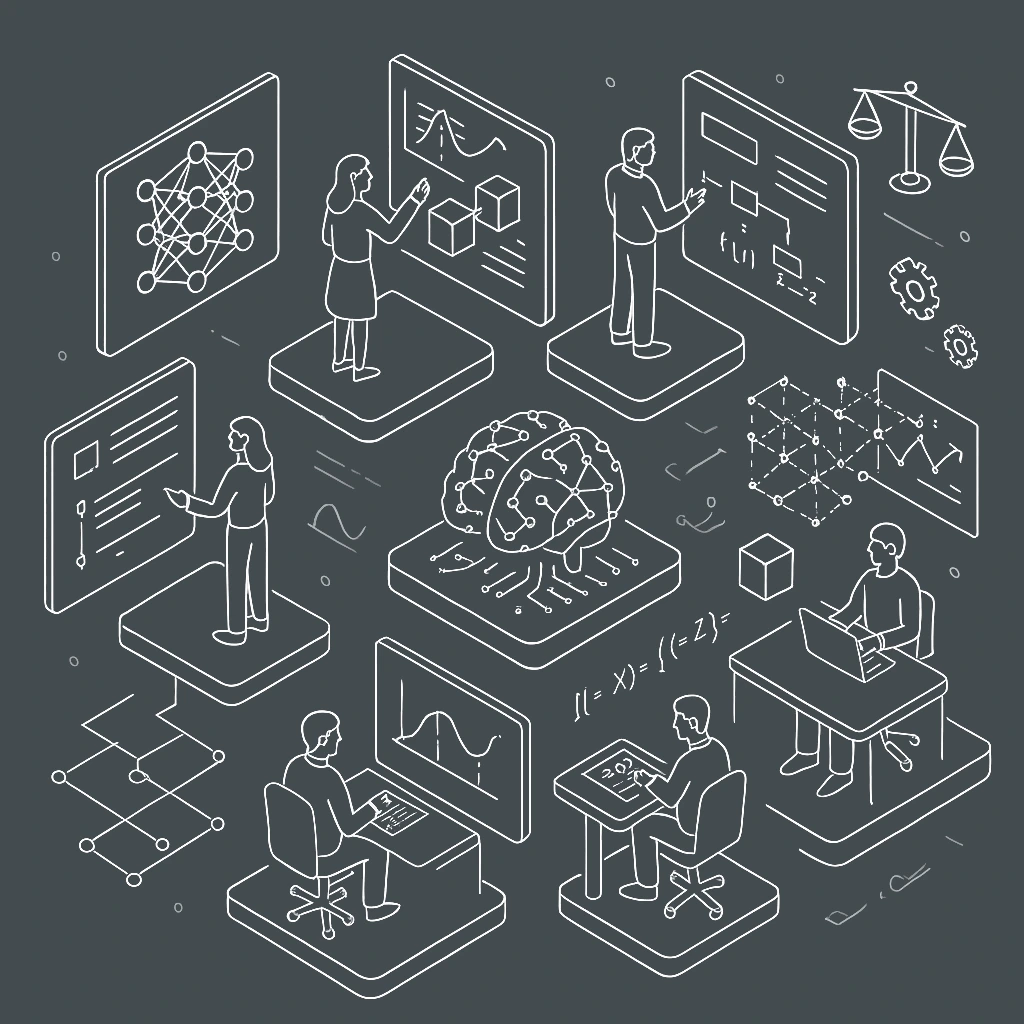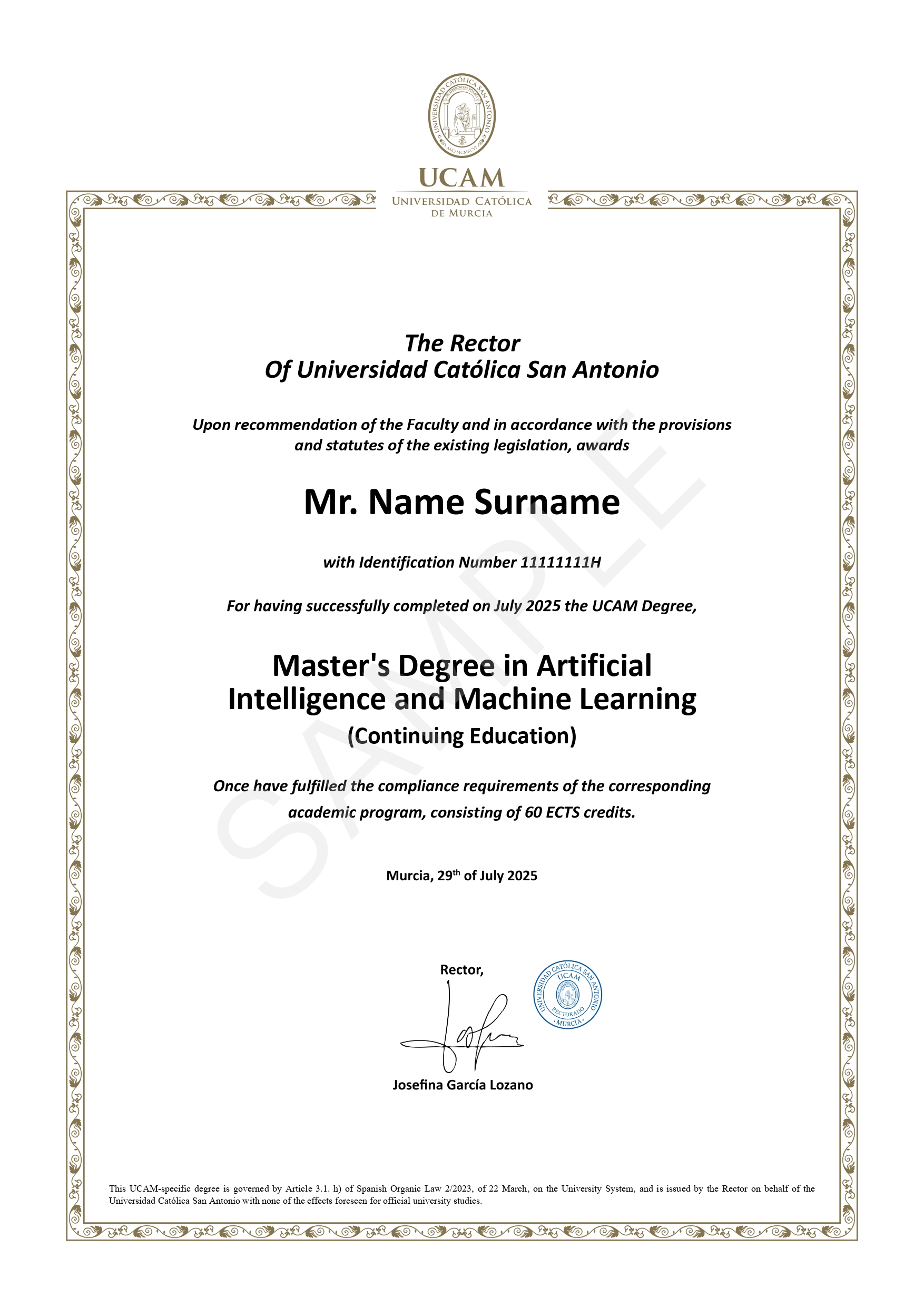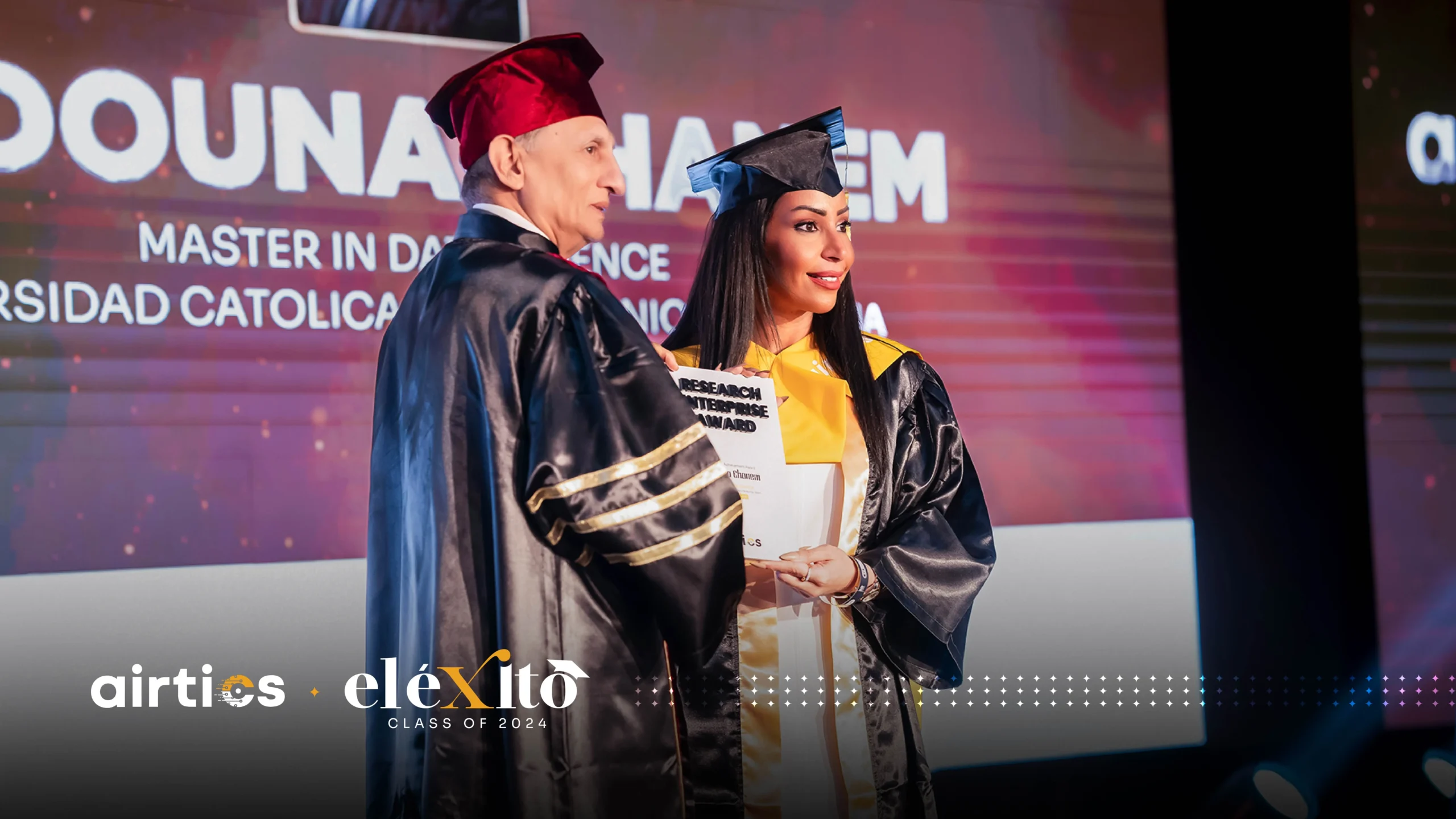

Master’s Degree in Artificial Intelligence and Machine Learning (Continuing Education)

Transform your career with our comprehensive 12-month Master’s program in Artificial Intelligence and Machine Learning, certified by UCAM University, Spain. This professional development program equips you with in-demand skills in Python programming, data analytics, machine learning, and AI implementation through 200 hours of live instructor-led training.

- Duration
12 Months
- Modules
6 Modules
- Assignments
6 Assignments
- Format
Blended Learning
- Projects
3 Projects
- Level
Advanced
Globally Recognized & Accredited:




Students Trained Globally
Industry-Aligned Programs
Countries with Active Alumni
Career Transition Success
- Industry-Standard Technology Stack
Tools & Technologies That Power Success
Master the complete data science ecosystem with hands-on experience using industry-leading tools and frameworks. Our Advanced Program in Data Science equips you with practical skills in Python programming, data manipulation, visualization, and machine learning – preparing you for real-world data challenges.
- Production-Ready Skills
- Industry-Relevant Tools
- Hands-On Learning
Python

MySQL

Anaconda

Jupyter Hub
Pandas
NumPy
Seaborn
Matplotlib
Excel
GIT
HTML

CSS
- Industry-Standard Technology Stack
Tools & Technologies That Power Success
Master the complete AI and machine learning ecosystem with hands-on experience using industry-leading tools and frameworks. Our Master’s Program in AI & ML equips you with practical skills in Python programming, data manipulation, visualization, and machine learning algorithms – preparing you for real-world AI challenges.
- Production-Ready Skills
- Industry-Relevant Tools
- Hands-On Learning
Python

MySQL

Anaconda

Jupyter Hub

TensorFlow
NumPy
Seaborn
Matplotlib
Excel
GIT

Tableau

Google Colab
Universidad Católica de Murcia, Masters Degree
Universidad Católica de Murcia (UCAM), founded in 1996, is a fully-accredited European University based out of Murcia, Spain. With learning centres in the Middle East and Southeast Asia, UCAM aims to provide students with the knowledge and skills to serve society and contribute to the further expansion of human knowledge through research and development. The university offers various courses, including 30 official bachelor’s degrees, 30 master’s degrees and ten technical higher education qualifications through its Higher Vocational Training Institute, in addition to its in-house qualifications and language courses. The programmes offered are distinguished in Europe and worldwide, with good graduate employability prospects as well. UCAM is accredited by ANECA (National Agency for Quality Assessment and Accreditation of Spain) and the Ministry of Education regarding 17 of its undergraduate degrees.

Eligibility
Prerequisites
Course Modules
Foundations of Python Programming
Begin your data science journey with a solid grounding in Python. Learn how to install and configure the Python environment, understand its simple syntax, and explore the essentials—variables, data types, and operators that form the building blocks of programming.
Control Flow and Core Data Structures
Gain hands-on experience with Python’s core control tools such as conditionals, loops, and functions. Understand and implement key data structures like lists, tuples, and dictionaries, essential for efficient data handling and logic building.
Applied Python for Data Science
Delve into Python’s powerful libraries—NumPy, Pandas, and Matplotlib—to treat, manipulate, and visualize data. Build confidence in writing clean, functional scripts that serve as the foundation for advanced analytics and machine learning.


Learning Outcomes
By completing this module, you will:
- Understand and apply Python syntax, variables, data types, and operators
- Use lists, tuples, dictionaries, and control flow statements to build logic
- Write reusable Python functions to solve data-driven problems
- Work with libraries like NumPy, Pandas, and Matplotlib for data analysis
- Develop confidence to use Python in machine learning and data science contexts
Core Math Foundations for AI
Build a strong mathematical base essential for understanding how AI systems work. Explore key topics such as linear algebra, calculus, and probability theory—each critical for grasping the inner workings of machine learning algorithms and intelligent systems.
Statistical Thinking and Data Interpretation
Master descriptive and inferential statistics to analyze real-world data. Learn how to formulate and test hypotheses, draw insights, and make evidence-based decisions. Develop the ability to interpret patterns and variability in complex datasets.
Mathematics in Action with Python
Translate theory into practice using Python libraries such as NumPy, Pandas, and Matplotlib. Visualize trends, analyze correlations, and apply statistical tools to build the foundation for evaluating and optimizing AI models.


Learning Outcomes
By completing this module, you will:
- Use NumPy, Pandas, and Matplotlib to manage and visualize data
- Apply descriptive and inferential statistics to draw meaningful insights
- Formulate hypotheses and validate them with real-world datasets
- Understand and apply probability theory and Bayes’ theorem
- Perform correlation and regression analysis to support AI modeling decisions
Python as the Backbone of AI Development
Explore Python’s power and flexibility in AI applications. Work with essential libraries like NumPy, Pandas, and Scikit-Learn to manipulate data, implement machine learning models, and streamline your AI development pipeline through hands-on coding exercises.
Data Collection, Cleaning, and Preprocessing
Master critical steps in preparing data for analysis. Learn to handle inconsistencies, missing values, and formatting errors in both numerical and text data. Understand the preprocessing techniques that ensure data quality and reliability in machine learning workflows.
Exploration, Modelling & Pattern Recognition
Dive into Exploratory Data Analysis (EDA), clustering, classification, and pattern discovery. Learn how to transform raw data into structured datasets ready for training algorithms and build predictive models with confidence using Python’s ML stack.


Learning Outcomes
By completing this module, you will:
- Understand the role of EDA, data cleaning, and preprocessing in ML workflows
- Apply Python libraries (NumPy, Pandas, Matplotlib, Scikit-learn) to real-world data
- Perform effective preprocessing on both numerical and text datasets
- Gain hands-on experience with clustering and classification techniques
- Identify patterns and transform raw data into actionable insights for model building
Foundations of Artificial Intelligence
Explore the core concepts of Artificial Intelligence and Machine Learning. Understand how machines learn from data without explicit programming, and gain insights into the real-world applications, challenges, and ethical considerations of AI across industries.
Supervised and Unsupervised Learning Techniques
Learn how to select and apply machine learning algorithms including linear regression, k-NN, decision trees, logistic regression, and random forest. Understand the differences between supervised and unsupervised learning and when to apply each technique.
Model Development, Evaluation & Ethics
Discover the complete ML workflow—from data preprocessing to model training, testing, and evaluation. Learn how to measure model performance using precision, recall, accuracy, and F1-score. Explore the ethical and practical aspects of AI adoption.


Learning Outcomes
By completing this module, you will:
- Understand the foundational principles of AI and machine learning
- Recognize the ethical, social, and legal challenges associated with AI
- Differentiate between supervised and unsupervised ML techniques
- Select appropriate algorithms for various business and data types
- Train and test ML models using practical datasets
- Evaluate models using precision, recall, F1-score, and accuracy
- Gain insight into the mathematical logic behind core ML algorithms
Mathematics & Machine Learning Foundations for NLP
Explore multivariate calculus and optimization techniques using Python to power resilient NLP systems. Understand how core mathematical intuitions—limits, series, and discrete optimization—shape intelligent language models and processes.
Hands-On NLP with Python & NLTK
Use Python’s Natural Language Toolkit (NLTK) for tokenization, parsing, entity recognition, and lemmatization. Extract key insights from text such as synonyms, antonyms, and patterns for building powerful ML-based NLP systems.
Neural Networks & Deep Learning Applications
Apply traditional and deep neural networks (FNNs, RNNs, CNNs) to NLP tasks like utterance classification and sequence tagging. Build advanced speech-based applications, from speech-to-text to automated speech recognition and deployment.


Learning Outcomes
By completing this specialization, you will:
- Acquire advanced Python skills for NLP applications
- Work with NLP packages to preprocess, vectorize, and analyze text
- Develop machine learning models for speech recognition and conversion
- Apply deep learning architectures like CNNs and RNNs to NLP use cases
- Understand the application of mathematical modeling in language processing
- Deploy automated NLP solutions for real-world language problems
Foundations of Image Processing & Deep Learning
Begin with image handling using the NumPy and OpenCV libraries to perform operations like color mapping, thresholding, gradients, and more. Learn the basics of video processing, webcam feeds, and the fundamentals of how machines “see” using Python.
Deep Learning & Computer Vision Models
Leverage neural networks—CNNs and RNNs—to build deep learning models for image and video recognition. Understand how to apply TensorFlow, Keras, and the Faster-RCNN-Inception-V2 model for identifying objects, people, and patterns within visuals.
YOLO, Clustering & Deployment in CV
Develop automated CV systems using real-time object detection techniques like YOLO. Explore both supervised and unsupervised ML algorithms such as K-Means and SVMs in CV applications. Work within the Anaconda environment to build, test, and deploy solutions.


Learning Outcomes
By completing this specialization, you will:
- Understand key concepts of computer vision and image processing in Python
- Use OpenCV and Pillow for working with images and live video feeds
- Develop deep learning models using CNN and RNN architectures
- Create real-time CV applications using YOLO and TensorFlow
- Understand the lifecycle of a deep learning model in CV projects
- Apply SVMs, KNN, and K-means clustering for image-based ML tasks
- Deploy object recognition systems using modern frameworks
Solving Real-World Problems with AI & ML
Work closely with industry mentors to design and implement AI/ML-driven solutions for real business challenges. Learn to identify critical problems, gather relevant data, and apply appropriate algorithms to solve high-impact use cases across industries like healthcare, finance, retail, and manufacturing.
Professional Collaboration and Project Execution
Gain exposure to industry-grade project management techniques. Develop, test, and evaluate AI solutions while effectively communicating with stakeholders. Build strong problem-solving and time management skills through structured methodologies and hands-on execution.
Career-Ready Application and Industry Impact
This capstone equips students with practical skills in end-to-end solution development, stakeholder engagement, and outcome measurement—offering unmatched real-world experience and exposure to potential employers across diverse sectors.


Learning Outcomes
By completing this capstone, you will:
- Apply AI & ML methodologies to solve complex, industry-specific problems
- Design and deploy AI/ML solutions from concept to implementation
- Collaborate with industry stakeholders in a professional setting
- Evaluate the real-world impact and effectiveness of AI/ML systems
- Develop project management, communication, and data-driven decision-making skills
Your Success Story Starts Here
Every image here tells a story of transformation, dedication, and success. Be the next to wear the cap and gown. Enroll today, and let your journey begin.
What Our Students Say
Every student has a story—of ambition, of challenge, of growth. In their own words, they share how Airtics became a turning point in their learning journey and helped them move closer to their goals.
Pemsith Ravi

- Verified Review
Zeeshan Ali

Airtics offers a truly transformative learning experience. The course content is up-to-date, the mentors are incredibly supportive, and the flexibility of the online platform made it easy to balance with my work. Highly recommended for anyone looking to upskill!
- Verified Review
Aalaa Shbair

The experience at Airtics College has been tremendous for me. It has illuminated my path and opened the way for me to become a developer of solutions in my workplace. I cherish every moment of this online learning experience and the supportive community of instructors and peers.
- Verified Review
Muhammad Fatouh

Airtics offered a great platform that allowed me to take a meaningful step forward in data science while balancing my demanding job as a telecom engineer. If you have a busy schedule and struggle with work-life balance, I encourage you to find a flexible platform like Airtics to pursue your goals.
- Verified Review
Al Tayyab Bakhsh

Coming from a non-technical background in marketing, switching to data science was challenging. The faculty at Airtics was incredibly helpful, especially my mentor Miss Piyali, who guided me with patience every step of the way. Their mentorship gave me the confidence to succeed.
- Verified Review
Dilnawaz Qureshi

Airtics provides an impressive curriculum for Python Full Stack development that is both well-structured and up-to-date. This comprehensive approach ensures we acquire a thorough understanding of the field and are well-prepared for real-world challenges.
- Verified Review
Charuhaas Shenoy

- Verified Review
Madonna Ghanem

The resources provided by Airtics for AI and ML students are top-notch. The institute has a well-equipped virtual lab with the latest software, allowing us to experiment with complex algorithms. The online library offers a wide range of reference materials and research papers.
- Verified Review
Dhruv Narse

Airtics provides a conducive learning environment for data analytics students. They have experienced faculty, and provide access to the latest software and tools used in the industry. This ensures that we are well-prepared for our future careers in the field.
- Verified Review
What Our Students Say
Every student has a story—of ambition, of challenge, of growth. In their own words, they share how Airtics became a turning point in their learning journey and helped them move closer to their goals.
Pemsith Ravi

- Verified Review
Zeeshan Ali

Airtics offers a truly transformative learning experience. The course content is up-to-date, the mentors are incredibly supportive, and the flexibility of the online platform made it easy to balance with my work. Highly recommended for anyone looking to upskill!
- Verified Review
Aalaa Shbair

The experience at Airtics College has been tremendous for me. It has illuminated my path and opened the way for me to become a developer of solutions in my workplace. I cherish every moment of this online learning experience and the supportive community of instructors and peers.
- Verified Review
Muhammad Fatouh

Airtics offered a great platform that allowed me to take a meaningful step forward in data science while balancing my demanding job as a telecom engineer. If you have a busy schedule and struggle with work-life balance, I encourage you to find a flexible platform like Airtics to pursue your goals.
- Verified Review
Al Tayyab Bakhsh

Coming from a non-technical background in marketing, switching to data science was challenging. The faculty at Airtics was incredibly helpful, especially my mentor Miss Piyali, who guided me with patience every step of the way. Their mentorship gave me the confidence to succeed.
- Verified Review
Dilnawaz Qureshi

Airtics provides an impressive curriculum for Python Full Stack development that is both well-structured and up-to-date. This comprehensive approach ensures we acquire a thorough understanding of the field and are well-prepared for real-world challenges.
- Verified Review
Charuhaas Shenoy

- Verified Review
Madonna Ghanem

- Verified Review
Dhruv Narse

Airtics provides a conducive learning environment for data analytics students. They have experienced faculty, and provide access to the latest software and tools used in the industry. This ensures that we are well-prepared for our future careers in the field.
- Verified Review
Real-World Capstone Projects
Apply your AI and machine learning skills to solve real business challenges through hands-on industry-based projects. Choose from our curated capstone projects across healthcare, finance, retail, manufacturing, and technology sectors, or bring your own organizational problem to create a portfolio that showcases your expertise to future employers.
Predictive Healthcare Analytics
Build a machine learning model to predict disease risk and treatment outcomes using patient data, medical history, and diagnostic parameters for improved healthcare decision-making.
Computer Vision System
Develop an advanced computer vision solution using deep learning and CNN algorithms to automatically detect, classify, and analyze visual data for real-world applications.
Business Intelligence Dashboard
Create interactive business dashboards that transform raw organizational data into actionable insights, predictive analytics, and visual reports for strategic decision-making.
Learn from Industry Leaders & Experts
Learn from the best in the field. Our faculty combines academic brilliance with industry expertise, featuring PhD holders, senior data scientists, and AI researchers from top organizations.
Global Student Community
Students from 60+ Countries Worldwide









Frequently Asked Questions
While traditional data science focuses primarily on data analysis and statistics, our AI & ML program goes deeper into artificial intelligence algorithms, neural networks, computer vision, natural language processing, and advanced machine learning techniques. You’ll learn to build intelligent systems that can learn, adapt, and make autonomous decisions.
No prior coding experience is required. Our curriculum starts with “Basics of Python” in Module 1, covering programming fundamentals, data types, operators, and control structures. We build your programming skills progressively throughout the program.
You’ll receive a Master’s degree in Artificial Intelligence and Machine Learning from Universidad Católica de Murcia (UCAM), Spain – a fully accredited European university. This degree can be attested in most nations and accepted for academic validation globally.
Graduates can pursue roles as AI/ML Engineers, Data Scientists, AI Research Scientists, Computer Vision Engineers, NLP Specialists, AI Product Managers, and AI Consultants. Our 94%+ placement record and strong industry partnerships help students transition into high-demand AI careers.
Still have questions?
If you have any other questions or need further information about our Master of Artificial Intelligence and Machine Learning program, don’t hesitate to contact us. Our admissions team is here to help you take the next step in your AI and machine learning career.


















